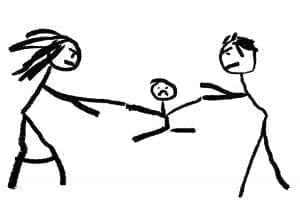Parenting After Separation & Divorce Part 1
 For parents who are divorced, the challenges of parenting after divorce are immense. As a co-developer and presenter of the Kids First After Divorce Program for over ten years, I am acutely aware of the challenges that separated and divorced parents experience. I have guided mothers and fathers through this difficult process, and have helped them to develop a path for parenting that protects their children.
For parents who are divorced, the challenges of parenting after divorce are immense. As a co-developer and presenter of the Kids First After Divorce Program for over ten years, I am acutely aware of the challenges that separated and divorced parents experience. I have guided mothers and fathers through this difficult process, and have helped them to develop a path for parenting that protects their children.
In negotiating the struggles of co-parenting, many parents often remark, “We now have to communicate and co-parent as divorced parents, when we couldn’t do this as parents living together in the same house. You’re asking us to do something as divorced parents, that we failed at while married. That’s going to be very tough.” That comment captures a lot. Because it speaks to the essential truth and demands that you experience as divorced parents.
Often while married, parents struggle with the challenges of parenting. They question each other’s judgments, argue over discipline, and at times, undermine each other’s authority with the children. This may be partially the actual cause behind a separation or divorce.
However, with a history of not ‘being on the same page with your parenting, divorce creates an even bigger challenge. If you are now going to improve your parenting as separated or divorced parents, you not only are tackling the challenge of learning effective parenting strategies, but you want to do this in a way that both parents are on the “same page.”
 And, yet, this is often not the case. Many parents go through the divorce process, NEVER able to reach a practical way of working together for the kids.
And, yet, this is often not the case. Many parents go through the divorce process, NEVER able to reach a practical way of working together for the kids.
Many parents struggle with their own anger, hurt, frustration, rage, bitterness, and guilt, and are not able to set their feelings aside long enough to co-parent wisely.
This often blinds us, if we are not careful. We can end up getting caught in the moment of anger or frustration, and our children get caught in the middle. While the phrase is over-used to the point that it loses meaning sometimes, the truth is that children really are “Caught In The Middle” and emotionally pulled in pieces by angry or battling parents.
The real damage becomes magnified if our emotions of fear, frustration, and anger also keep us from taking ownership of our own mistakes. It’s easy to point the finger, of course, and notice the mistakes of your ex-partner. In this mode, we focus blame and responsibility on the “other parent” and accept little responsibility for our choices along the way.
Amidst the overwhelming emotions of separation and divorce, this is understandable. Yet, what our children need is for us to learn to co-parent effectively.
This is not to say that this is easy. It is not. Work and effort are required. Taking ownership of your own strengths and your weaknesses is also necessary.
The Truth Is That Children Can Still Thrive…IF Mom and Dad Get It Right
It is critical to say what is true, however. And the truth is this: Your children can thrive following a divorce. However, the potential for them to thrive is directly related to how effectively you and your ex-partner co-parent.
 If you and your ex can communicate regarding issues that concern the children and develop an effective set of strategies for raising healthy, happy, and motivated children, your children will likely adjust adequately to a separation or divorce.
If you and your ex can communicate regarding issues that concern the children and develop an effective set of strategies for raising healthy, happy, and motivated children, your children will likely adjust adequately to a separation or divorce.
Other factors enter into the reality of your child’s adjustment to divorce. Some children are more resilient, even if they make mistakes. Some children are already at high risk and are much more vulnerable. However, whatever has happened in the past, we can conclude one very important truth: You can’t change it. It’s done.
So that means, it’s healthy, functional, and useful to focus now on what is within your control…and abandon investing your life energy into any thought, or any action, or anything…that is not within your control. Those will WASTE your life, and start you down the path of ignoring the parts that you can control. Many co-parenting programs, including my Terrific Parenting After Divorce Program, show you how to focus on the parts that do make a difference for you and your children, as well as give you the practical tools of effective co-parenting.
On the other hand, if you and your ex hold on to bitterness, anger, and hostility, and the children are caught in between, they may experience any of the following stressors:
- Relaying messages – pleasant and unpleasant – to the other parent.
- Overhearing negative comments about a parent or relative they love.
- Listening to their father or mother explode over a missing sock or a late payment.
- Experiencing emotional distance as parents struggle with sadness or anger.
- Being exposed to adult material about courts, attorneys, and judges.
- Having their time unnecessarily limited with those they love out of parental greed or anger.
- Living in fear over explosive outbursts during exchanges or phone calls.
- Learning to manipulate parents by giving parents the information that parents want to hear.
- Experiencing different consequences for the same behavior at each home.
- Having parental authority undermined by the other parent second-guessing parental actions.
- Begin judging parents too early, as they are asked questions about the other parent’s behaviors and actions.
- Find themselves used as investigators answering questions about boyfriends and girlfriends.
- Losing sleep and feeling sadness over “secrets” that they can’t share with someone they love.
- Being forced to make choices by parents whose own emotional weaknesses cause them to force their children to choose.
- Being forced to sort out “the truth”, when each parent has their own version of their truth they give to the children.
- Losing contact with grandparents, nieces, and nephews because of parental anger.
- Missing key information in class because parents disagree about schedules, and weekend changes disrupt routines and patterns.
- Carrying the emotional burden of parents who share too much of their own emotional baggage with children.
And the list goes on. This is only a sample of the challenges that children must deal with in difficult divorce situations. Healthy families recognize the destructive and hurtful impact of such poor choices on children. They work hard to guard their children against exposure to these types of behaviors. Yet, many children experience parents who do not use good judgment in these situations. These are the most predictable situations where children will struggle.
What Can You Do To Help Your Child?
1. GET RID OF YOUR EMOTIONAL BAGGAGE.
 This is the first and most important step that you’ve got to take. If you harbor resentment, if you carry anger and hatred, if you’re frustrated and disappointed, if you are guilt-ridden, or if you carry any other intense emotion related to the divorce, this will get in the way of your judgment.
This is the first and most important step that you’ve got to take. If you harbor resentment, if you carry anger and hatred, if you’re frustrated and disappointed, if you are guilt-ridden, or if you carry any other intense emotion related to the divorce, this will get in the way of your judgment.
I don’t know you personally. I simply know from experience and from the research that we have on human emotion, that your judgment will be impaired if you have intense emotions or feelings about your ex.
So the first essential step is to take care of your own garbage.
How might you do this? Here is a partial list:
- Contact a therapist or Parenting Coach, such as Dr. Cale, experienced in working with divorced parents.
- Begin a journal to write down your thoughts, and do so in handwriting, not on the computer.
- Find a support group of friends and family members who are not divorced.
- Attend an educational course on co-parenting after divorce.
- Find workshops on letting go of your anger after divorce.
- Go to the library, or the bookstore, and find books on releasing your feelings following a painful divorce.
- Begin to meditate, or practice daily relaxation exercises.
- Run, or exercise regularly.
- Avoid hiding by using alcohol or drugs.
- Focus your attention consistently and regularly on what you want, and not what you don’t want.
- Develop a mantra, an internal saying, that you can repeat to yourself, such as “Be kind and loving.”
- Limit yourself to ten minutes daily of giving any thought or attention to feelings of anger, frustration, etc.
- As your children go to bed each night, look deeply into their eyes, and realize that there is a little tiny “note-taker” inside their head. This note taker is keeping track and is learning from you about how to handle life’s most difficult challenges. And that note taker is always taking notes. Then ask yourself “What notes did they take today?”
You can’t give to your kids what you don’t possess. In other words, if you are feeling like life is falling apart at the seams…then YOU GET HELP.
Don’t wait. Don’t delay. Don’t make excuses. Don’t pretend you are feeling okay when your actions say otherwise.
Thus, the first step is to make sure you take care of yourself…so you will be better prepared to make good judgments about your children’s needs.
In the next step, you will learn where to get your real-life after-divorce education.
Parenting After Separation & Divorce Part 2
2. EDUCATE YOURSELF ABOUT CO-PARENTING AFTER DIVORCE.
 By co-parenting after divorce, I am referring specifically to the strategies that have to do with handling children in two households. This includes everything from routines, times-sharing, phone calls, and communications between parents. This is no therapy. The focus is on establishing agreements about how to most effectively handle the children.
By co-parenting after divorce, I am referring specifically to the strategies that have to do with handling children in two households. This includes everything from routines, times-sharing, phone calls, and communications between parents. This is no therapy. The focus is on establishing agreements about how to most effectively handle the children.
You really have three options when it comes to co-parenting.
Best: Convince your ex-partner to work conjointly with you in a co-parenting process. Both of you could meet jointly with a therapist in their office, or you could conduct this type of work by telephone.
In essence, this is a form of parent coaching that is highly driven by practical input. A psychologist that has experience in this area will be able to give firm, direct guidance about the kinds of strategies that are effective and healthy for children in a post-separation world.
By using this type of professional guidance, you will be able to tailor an individualized co-parenting plan that is best for your family.
 Better: Attend a course on co-parenting, and take careful notes. Find all of the resources and information possible on co-parenting, and master this information.
Better: Attend a course on co-parenting, and take careful notes. Find all of the resources and information possible on co-parenting, and master this information.
Then convince your ex-partner to co-participate in this type of course. At a minimum, give them materials to read, and then ask them to set times to discuss this information with you.
Set specific times to get together with your ex, and develop a strategy of co-parenting. In many cases, you can do this. Find parents who have been successful at co-parenting, and learn from them. Be cautious of those parents who are consumed with their own anger, and insist that they are the only ones who “know what’s in the kid’s best interest.” Too often, emotions blind judgment…and such toxic individuals can corrupt your view of how to co-parent effectively.
Dr. Cale’s Special Report 3 Toxic Mistakes That Will Threaten Your Children’s Future
** Please double-check for accuracy. Your privacy is SAFE. We will NEVER sell/rent/give away your information.
I have authored a co-parenting manual for parents focused exclusively on the issues of co-parenting after divorce. The manual, Terrific Parenting Through Divorce: Keeping Kids First, is a revised version of the manual used in the co-parenting program my partners and I taught for over ten years in the Albany area. This manual is a powerful guide, showing parents the specific ways in which they can buffer their children from the impact of divorce. Not only will the reader gain insight into what factors impact children, but they also will be equipped to develop a co-parenting plan which helps to insulate their children from the debilitating challenges of living in two households.
For many parents, you’ll find that the Terrific Parenting Through Divorce: Keeping Kids First manual provides a comprehensive blueprint for structuring your own individualized co-parenting arrangement. If you find yourself wanting answers to specific questions, you may want to consult with Dr. Cale by phone [ Contact Dr. Cale ] or find an expert in your area who specializes in divorcing families.
The Topics Covered Include:
- How parents handle and mishandle divorce.
- Ways to handle your intense emotions, and resolve pain
- Strategies for talking to kids
- Impact of divorce on children.
- Role of key players, such as grandparents, lawyers, courts.
- How to stay focused on what you can control.
- Ways to stay calm and focused during exchanges.
- Ways to help kids cope with the many changes.
- How to help children with difficult exchanges.
- What tools you can offer children.
- Resources to help you and your children.
- And more.
Please consider this valuable program, as your satisfaction is guaranteed. If interested, you can order this program here: Click here for Terrific Parenting Through Divorce: Keeping Kids First.
Good: Under very difficult circumstances, there are times when the other parent will not communicate with you. Under these circumstances, learn all that you can about co-parenting. Take all the steps that you possibly can to protect your children and implement these consistently and regularly.
In other words, do everything that you can to effectively parent with that part of your children’s lives that you do have control over. Make certain that everything that you do in your home and the kids’ lives is healthy and beneficial for your children. Again, educate yourself. Consider participating in a divorce education program…even if your ex refuses. Be more focused on what you can control…and begin to put less energy into decisions out of your control.
In this type of situation, you may have little to no control over what your ex is doing. You may not influence what your ex says or does with the children. All that you do have control over is what you do in response to what your children present to you. That is where you must focus your attention. That is where you must focus your energy. That is where you must become an exquisite parent.
3. BECOME A MASTER AT PARENTING (I.E., Understanding How You Have Influence With Your Children)
 When you do this, tensions and conflicts are reduced.
When you do this, tensions and conflicts are reduced.
What I am referring to are the fundamentals of parenting. I am referring to learning how you influence your children’s behavior. I am referring to how you develop a strong and enduring relationship with your children. And I am referring to how you create healthy, responsible children who enjoy being a part of their families.
In essence, this means that you do not leave parenting to chance. You do not rely upon the advice of neighbors or family members. You do not get your input from a newspaper columnist.
Instead, you seek out the best help that’s available and use it to obtain the tools that it takes to shape your children’s behavior effectively.
If you reviewed the pages on the ”Essential Parenting Home Study Program” that is available, then you’re probably aware of some of the tools and strategies that are available. You can also get valuable information from other portions of this website that cover specific problems you may be having with your children. You can also get tons of valuable information, including state-of-the-art parenting input, by subscribing to Dr. Cale’s free email newsletter, ”Terrific Parenting Newsletter.”
Lastly, it is important to note that difficult situations may require more personalized attention. You may feel that you need face-to-face guidance. If you feel your situation warrants this, seek out an expert in your area. Find a psychologist or therapist with years of experience in this area, as this will greatly reduce your learning curve.
4. AVOID LITIGATION …IF AT ALL POSSIBLE.
Many parents do not appreciate the powerfully disabling impact of toxic litigation on children. During the divorce process, parents can easily get lost focused on the choices of their ex-partners, and lose sight of their choices.
We know that this is something all humans are vulnerable to do. Under conditions of intense emotion, our energies tend to move toward the protection of self and family. When we do so, our focus tends to go toward events out of our control…and we then take less responsibility for decisions that ultimately lead to litigation.
Keep talking. Find a mediator…a good mediator…who will make certain you both be an active part in the decision-making. The research is clear on the side of your children…when you work things out without prolonged litigation. On the other hand, you put your kids at heightened risk when you engage in extended litigation.
Why? Because…it impacts you…it impacts the quality of communications…it impacts the demands upon kids…it impacts the intensity of parental emotion that kids must now absorb…and the list could go on.
Bottom line:
DO YOUR BEST TO AVOID LITIGATION… AND YOU’LL HAVE MORE ENERGY LEFT FOR YOUR KIDS.
Don’t forget to get your free report and 15 co-parenting principles that protect your children.














